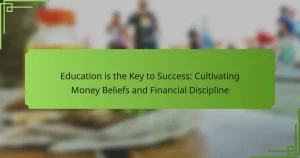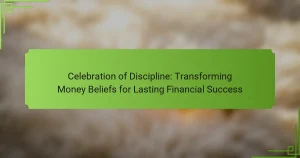Transforming your money mindset is essential for achieving financial discipline and success. Key principles include understanding money psychology, setting clear financial goals, and adopting a growth mindset. Essential and lesser-known books provide unique insights and practical tools to reshape your financial habits. Engaging with these titles can lead to profound shifts in your approach to personal finance management.

What are the key principles of money beliefs and discipline?
Key principles of money beliefs and discipline include understanding the psychology of money, setting clear financial goals, and adopting a growth mindset. These principles encourage individuals to reshape their financial habits and beliefs for better outcomes. A transformative book on this topic emphasizes the importance of awareness and accountability in financial decisions. For instance, recognizing limiting beliefs can lead to more informed choices and improved financial discipline. Engaging with literature that challenges existing money mindsets fosters a proactive approach to personal finance management.
How do money beliefs shape financial behavior?
Money beliefs significantly influence financial behavior by shaping attitudes towards saving, spending, and investing. Transformative books can help readers identify and alter limiting beliefs, fostering a healthier money mindset. For instance, “The Psychology of Money” by Morgan Housel emphasizes the importance of understanding emotional aspects of money management. Engaging with such literature can lead to improved financial discipline, motivating individuals to adopt proactive financial strategies. As a result, readers often experience a shift towards more positive financial habits and increased wealth accumulation.
What role does financial discipline play in achieving goals?
Financial discipline is crucial for achieving goals as it fosters consistent saving and smart spending. By cultivating this discipline, individuals can align their financial habits with their aspirations, leading to better decision-making. Books that transform money mindsets often emphasize strategies to enhance financial discipline, such as budgeting techniques and investment principles. These resources provide actionable insights that empower readers to take control of their finances, ultimately facilitating goal attainment and long-term success.

Which books are essential for transforming money mindset?
Essential books for transforming money mindset include ‘Rich Dad Poor Dad’ by Robert Kiyosaki, ‘The Total Money Makeover’ by Dave Ramsey, and ‘You Are a Badass at Making Money’ by Jen Sincero. These titles emphasize financial discipline, wealth-building strategies, and mindset shifts. Each book offers unique insights that can radically alter your approach to money management.
What are the top recommended titles for changing money beliefs?
“Books That Will Change Your Life: Transform Your Money Mindset and Build Financial Discipline” includes several recommended titles. “You Are a Badass at Making Money” by Jen Sincero emphasizes self-worth in financial success. “The Millionaire Next Door” by Thomas J. Stanley and William D. Danko explores habits of wealthy individuals. “Rich Dad Poor Dad” by Robert Kiyosaki contrasts different money mindsets. “The Psychology of Money” by Morgan Housel delves into behavioral finance. “The Total Money Makeover” by Dave Ramsey focuses on financial discipline and budgeting.
How do these books address financial discipline?
These books emphasize practical strategies for developing financial discipline. They provide actionable insights, such as budgeting techniques, saving methods, and investment principles. For example, “The Total Money Makeover” by Dave Ramsey outlines a step-by-step plan to achieve financial stability. Additionally, “Rich Dad Poor Dad” by Robert Kiyosaki contrasts different money mindsets, encouraging readers to adopt a proactive approach to wealth. Overall, these resources foster a mindset shift, promoting long-term financial health through disciplined habits.
What are the core themes in these transformative books?
The core themes in transformative books about money mindset focus on personal growth, financial literacy, and discipline. These books emphasize shifting perspectives on wealth, understanding financial systems, and developing habits that foster financial success. Key themes include the importance of mindset shifts, the role of education in financial decision-making, and actionable strategies for building wealth.

What unique perspectives do bestselling authors offer?
Bestselling authors provide unique perspectives that challenge conventional thinking about money and financial discipline. Their insights often stem from personal experiences, highlighting transformative strategies that can reshape readers’ financial mindsets.
These authors emphasize the importance of emotional intelligence in financial decisions, advocating for a mindset shift from scarcity to abundance. They share practical tools and frameworks that encourage disciplined saving and investing habits, making financial success more attainable.
Additionally, bestselling authors often incorporate storytelling techniques that resonate with readers, making complex financial concepts relatable and actionable. Their narratives can inspire readers to take control of their finances and pursue long-term goals.
Through their diverse backgrounds and experiences, these authors offer rare insights that can catalyze profound changes in how individuals perceive and manage their money.
How do personal stories enhance understanding of money beliefs?
Personal stories enhance understanding of money beliefs by providing relatable experiences that illustrate financial concepts. They humanize abstract ideas, making them more accessible. Readers connect emotionally, which fosters deeper reflection on their own beliefs. For instance, narratives about overcoming debt can inspire action and shift mindsets. Personal anecdotes serve as powerful tools for change, demonstrating that financial discipline is achievable.
What unique strategies are presented in these books?
These books present unique strategies that reshape your financial perspective. They emphasize mindset shifts, discipline-building techniques, and actionable steps for wealth creation.
One unique strategy involves reframing money as a tool for freedom rather than a source of stress. Another focuses on cultivating habits that promote financial literacy and long-term planning. Additionally, these books often provide frameworks for goal-setting that align personal values with financial objectives.
By integrating these strategies, readers can develop a holistic approach to managing finances and achieving financial independence.

What rare insights can be found in lesser-known titles?
Lesser-known titles often provide unique insights that can transform your money mindset. These books challenge conventional financial wisdom, offering fresh perspectives on financial discipline. For instance, they may explore emotional spending, the psychology of wealth, or unconventional saving techniques. Such insights encourage readers to rethink their financial habits and adopt more effective strategies. Engaging with these titles can lead to profound shifts in understanding money management and personal finance.
Which unconventional books challenge traditional money beliefs?
Books that challenge traditional money beliefs include “Rich Dad Poor Dad” by Robert Kiyosaki, which emphasizes financial education over formal schooling. “The Millionaire Fastlane” by MJ DeMarco advocates for entrepreneurship as a path to wealth. “You Are a Badass at Making Money” by Jen Sincero focuses on mindset shifts to attract wealth. “The Psychology of Money” by Morgan Housel explores behavioral finance and the emotional aspects of money. These unconventional perspectives encourage readers to rethink their financial strategies and beliefs.
What unique financial disciplines are explored in these titles?
These titles explore unique financial disciplines such as behavioral finance, budgeting strategies, and investment psychology. They emphasize the importance of mindset shifts and disciplined spending to achieve financial independence. The focus on emotional intelligence in financial decision-making is a rare attribute that sets these books apart. Additionally, they provide practical frameworks for cultivating long-term financial habits, reinforcing the overall theme of transformative financial education.

How can readers apply lessons from these books in daily life?
Readers can apply lessons from these books by integrating practical financial habits into their daily routines. Start by setting clear financial goals, such as saving a specific percentage of income each month. Implement budgeting techniques from the books to track expenses and identify areas for improvement. Utilize mindset shifts to cultivate a positive relationship with money, focusing on abundance rather than scarcity. Regularly review financial progress to stay motivated and accountable. Lastly, engage in continuous learning by revisiting key concepts to reinforce financial discipline and adaptability.
What actionable steps can improve financial discipline immediately?
To improve financial discipline immediately, start reading transformative books that reshape your money mindset. Focus on actionable strategies such as setting clear financial goals, tracking expenses, and creating a budget. Prioritize education by engaging with resources that emphasize the psychology of money, helping you understand your spending habits. Additionally, practice mindfulness in financial decisions to cultivate a disciplined approach.
What common mistakes should be avoided when changing money beliefs?
To change money beliefs effectively, avoid these common mistakes: neglecting self-awareness, resisting discomfort, setting unrealistic goals, and failing to seek support. Acknowledging your current mindset is essential for transformation. Embrace the discomfort of change; growth often requires stepping outside your comfort zone. Set achievable, incremental goals to build financial discipline. Lastly, engage with communities or resources, such as books that inspire a positive money mindset, to reinforce your journey.
What are the best practices for sustaining a transformed mindset?
To sustain a transformed mindset, regularly engage with life-changing literature that reinforces financial discipline. Embrace practical strategies from these books, such as setting clear financial goals and tracking spending habits. Incorporate daily affirmations to strengthen your money mindset. Surround yourself with supportive communities that share similar financial aspirations. Finally, practice mindfulness to maintain focus on your financial journey.




